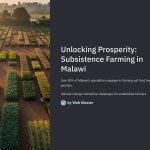

 Malawi heavily relies on agriculture, with over 80% of its population engaged in farming. citeturn0search0 However, food insecurity remains a persistent challenge due to erratic rainfall, poor soil conditions, and limited access to modern farming techniques. Subsistence farming, where smallholder farmers grow food primarily for their own consumption, plays a crucial role in ensuring food security and economic stability. As climate change intensifies, promoting sustainable farming methods and government support is essential for improving productivity and resilience.
Malawi heavily relies on agriculture, with over 80% of its population engaged in farming. citeturn0search0 However, food insecurity remains a persistent challenge due to erratic rainfall, poor soil conditions, and limited access to modern farming techniques. Subsistence farming, where smallholder farmers grow food primarily for their own consumption, plays a crucial role in ensuring food security and economic stability. As climate change intensifies, promoting sustainable farming methods and government support is essential for improving productivity and resilience.

The Backbone of Malawi’s Economy: Why Subsistence Farming Matters
Subsistence farming is not just a way of life in Malawi—it is the foundation of the country’s economy. With most Malawians depending on agriculture for their livelihoods, the sector contributes significantly to employment and sustenance. Small-scale farmers primarily cultivate maize, cassava, and groundnuts, which form the staple diet of many households.
Despite its importance, subsistence farming faces numerous challenges, including low yields due to poor soil fertility, unpredictable weather patterns, and lack of access to quality seeds and fertilizers. Government initiatives, along with support from non-governmental organizations, are crucial in helping farmers adopt climate-smart agricultural practices. By improving techniques such as crop rotation, irrigation, and organic fertilization, Malawi can ensure a more sustainable and productive agricultural future.

Challenges Hindering Productivity in Subsistence Farming
One of the biggest obstacles facing Malawian farmers is climate change, which has resulted in prolonged droughts and unpredictable rainfall. These environmental changes directly impact crop yields, leading to food shortages and increased poverty. Additionally, limited access to modern farming tools and techniques keeps many farmers trapped in a cycle of low productivity and subsistence-level existence.
Another major challenge is soil degradation caused by continuous cropping without replenishing nutrients. Without access to fertilizers or knowledge of sustainable soil management practices, productivity declines over time. Addressing these issues requires a combination of government intervention, education, and the adoption of agroecological farming methods.

Sustainable Solutions for Enhancing Subsistence Farming
To improve subsistence farming in Malawi, several sustainable solutions must be implemented:
- Climate-Smart Agriculture: Encouraging drought-resistant crops and efficient water management techniques can mitigate climate risks.
- Soil Conservation Methods: Practices such as crop rotation, agroforestry, and organic composting can enhance soil fertility.
- Access to Financial Support: Microfinance programs and agricultural loans can help farmers invest in better seeds, fertilizers, and tools.
- Education and Training: Teaching farmers modern and sustainable agricultural techniques can increase productivity and resilience.
With the right policies and support, subsistence farming can evolve into a more productive and sustainable sector, ensuring food security for Malawi’s growing population.

Government and NGO Support: Key to Agricultural Transformation
The Malawian government, along with international organizations, has introduced various initiatives to support small-scale farmers. Programs such as the Farm Input Subsidy Program (FISP) provide farmers with affordable fertilizers and seeds to boost productivity. Additionally, NGOs like the World Food Programme (WFP) and ActionAid work closely with local communities to improve agricultural techniques and provide resources.
However, more investment is needed to expand these programs and ensure long-term sustainability. Strengthening agricultural policies, improving infrastructure, and expanding access to markets will help farmers transition from mere subsistence to commercial farming, thereby contributing more significantly to the national economy.

The Future of Subsistence Farming: Moving Towards Sustainability
The future of subsistence farming in Malawi depends on embracing sustainable and innovative practices. With the global emphasis on food security and climate resilience, integrating technology, irrigation systems, and renewable energy sources into agriculture can transform the sector.
Moreover, empowering women and youth in agriculture through training programs and financial support will ensure a more inclusive and dynamic agricultural landscape. Investing in research and development to introduce high-yield and drought-resistant crop varieties will further enhance food security.
6imz_ Conclusion: Strengthening Subsistence Farming for a Better Malawi
Subsistence farming remains the backbone of Malawi’s economy and food security. However, challenges such as climate change, poor soil conditions, and limited resources hinder its full potential. By implementing sustainable farming practices, increasing government and NGO support, and embracing technological advancements, Malawi can achieve greater agricultural resilience.
With collective efforts from policymakers, farmers, and international organizations, subsistence farming can transition from a survival strategy to a pathway for economic growth and sustainability, ensuring a better future for Malawians.

